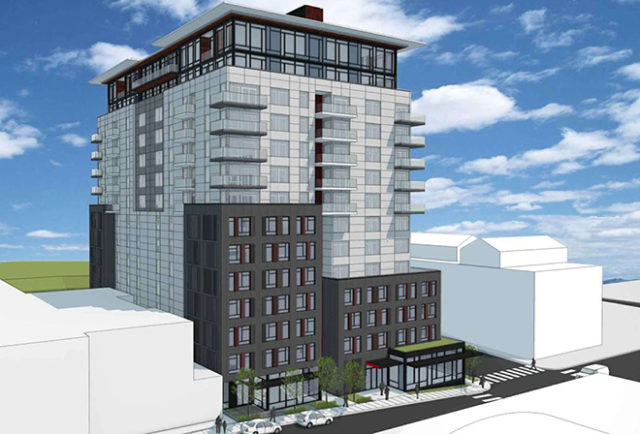by Nina Wallace, Chinatown International District Coalition
Seattle’s Chinatown-International District is unique in a lot of ways. It’s the only place in the country where Japanese, Chinese, Filipino, and Vietnamese immigrants and Black and
Native neighbors settled alongside each other to create one vibrant, multi-ethnic community. It’s also the neighborhood where residents, businesses and cultural organizations face the highest risk of displacement within the city. Hotel Concepts’ plans to construct a 16-story luxury hotel at 8th and Lane adds to that threat.
At a recent meeting with the International Special Review District board—which approves design projects based on whether they uphold the cultural, economic and historical
qualities of the CID—some community members voiced support for the development, saying they hoped it would increase public safety, help local businesses thrive, and revitalize the neighborhood. I share their concerns.
As someone who lives and works here, I witness every day the crisis of our unhoused neighbors forced to sleep outside, the mom-and-pop shops priced out of business after generations of serving the community.
I too want a safe, thriving, familyfriendly CID, a place where Jiichans and Pau Paus can access the services they need and young people can connect with our history and culture. The proposed SpringHill Suites Marriott Hotel will deliver the exact opposite.
Hotel Concepts has failed, repeatedly, to demonstrate any good-faith commitment to the current health and future prosperity of the CID. Despite overwhelming opposition to the
massive scale of the project—the hotel, if built, would tower more than 12 stories over every other building in the neighborhood—the developers recently added another two stories to their original proposal. Requests to explain why the hotel’s street traffic would be directed to the pedestrian-heavy South Lane turnaround, vital to the daily use of
hundreds of seniors and children as well as emergency service providers, rather than the much safer alternative on 8th Street have been met with a stone wall.
Even more troubling, representatives for Hotel Concepts have repeatedly dismissed valid concerns about how a luxury development inaccessible to the vast majority of the CID’s
current residents would exacerbate the displacement of low-income elders and families. U.S. Census data shows the median household income in the CID is less than $25,000, compared to more than $75,000 citywide, and 40% of area residents, many of whom are immigrant elders, live below the federal poverty line. There is a dire need for affordable
housing in the CID, yet the design team continues to evade questions as to whether any of the 103 planned apartments will be low-income units, if the jobs created by the hotel will pay a living wage, and if the commercial and communal space on the ground floor will be made available to existing businesses and cultural organizations.
The design team’s limited public outreach efforts have consistently excluded community members with dissenting opinions. A recent survey distributed to a targeted audience of just 186 CID residents and business owners dishonestly claimed to represent over 2,200 in favor of the hotel. But dozens of people who packed last month’s ISRD meeting had never even heard of the survey. How can we trust Hotel Concepts’ vague promises to “improve” the CID when they refuse to engage with our community in any meaningful
way?
I am all for development that benefits the people of the CID. But what we are witnessing in Seattle is the beginning of a story already playing out in shrinking Chinatowns and Nihonmachis across the country. Developers with deep pockets and few ties to the local community buy up property in historic cultural districts by outbidding nonprofits that would have used the land to provide healthcare, housing and other vital services. (As
was the case with this hotel, ICHS and SCIDpda tried to purchase it to build an aging-in-place facility for API elders.)
Promises are made that wealth brought in by luxury condos, upscale shops, and chain restaurants will trickle down to the rest of the community. Instead, longtime residents and businesses are pushed out by skyrocketing rents and an onslaught of “redevelopment.” A recent study by the National Coalition for Asian Pacific American Community Development revealed that over 350 low-income API families were already displaced from the CID
between 2007 and 2014. Those numbers will continue to climb unless we invest in affordable, community-oriented development.
preventing displacement and protecting the integrity and vitality of the CID as an inter generational, multicultural, and self-sustaining community. Made up of community members who live, work, and have deep cultural and familial ties to the Chinatown-International District, the CID Coalition can be reached at cidnohotel@gmail.com or on Facebook at Humbows Not Hotels.








